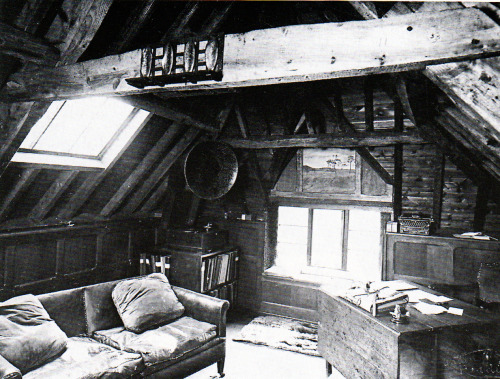telawrence:In those days the two bottom rooms were full of firewood and lumber. We lived upstairs,
telawrence: In those days the two bottom rooms were full of firewood and lumber. We lived upstairs, and the sitting room there looks now much as did then, though the gramophone and the books have gone, and the fender with its bent ironwork has been remodelled. It was, and it is, a brownish-room – wooden beams and ceiling, leather-covered settee. Here we talked, played Beethoven’s symphonies, ate and drank. We drank water only or tea–no alcohol ever entered Clouds Hill … and we ate–this sounds less romantic–out of tins. T.E. always laid in a stock of tinned dainties for his guests. There were no fixed hours for meals and no one sat down. If you felt hungry you opened a tin and drifted about with it… T.E. slept in camp, coming out when he could during the day, as did the rest of the troops. It was fine being alone in Clouds Hill at night: so silent… I don’t know whether I’m at all conveying in these trivial remarks the atmosphere of the place–the happy casualness of it, and the feeling that no one particularly owned it. T.E. had the power of distributing the sense of possession among all the friends who cam there. When Thomas Hardy turned up, for instance, as he did one sunny afternoon, he seemd to come on a visit to us all, and not specially to see his host. Thomas Hardy and Mrs. Hardy came up the narrow stairway into the little brown room and there they were–the guests of us all. To think of Clouds Hill as T.E.’s home is to get the wrong idea of it. It wasn’t his home, it was rather his pied-a-terre, the place where his feet touched the earth for a moment, and found rest. E. M. Forster’s description of Clouds Hill from The Listener, September 1st, 1938 -- source link
Tumblr Blog : telawrence.tumblr.com



